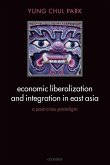State Capacity in East Asia examines states and state capacity in four countries - China, Japan, Taiwan, and Vietnam - that have experienced rapid economic growth over several decades. The book is informed by the view that even though modern market forces and transnational corporations exert new pressures which erode some powers formerly held by the nation-state, it is much too early to declare the state dead. The modern state is constantly being shaped by social interaction in a process of mutual empowerment at both the central and local level. States also have a history which is built into their structures and ideology and will influence the way they change and adapt to outside pressures. The book argues that the capability to adapt and to develop new capacities and institutions is at the heart of the Asian states' recovery from the deep economic and social crisis of the late 1990s.
This book examines states and state capacity in four countries that have experienced rapid economic growth over several decades, China, Japan, Taiwan, and Vietnam It argues that while modern market forces and transnational corporations exert tremendous pressures, states still matter. The capacity of the East Asian state to adapt and develop new institutions is empirically illustrated as well as theoretically contextualized.
Hinweis: Dieser Artikel kann nur an eine deutsche Lieferadresse ausgeliefert werden.
This book examines states and state capacity in four countries that have experienced rapid economic growth over several decades, China, Japan, Taiwan, and Vietnam It argues that while modern market forces and transnational corporations exert tremendous pressures, states still matter. The capacity of the East Asian state to adapt and develop new institutions is empirically illustrated as well as theoretically contextualized.
Hinweis: Dieser Artikel kann nur an eine deutsche Lieferadresse ausgeliefert werden.








